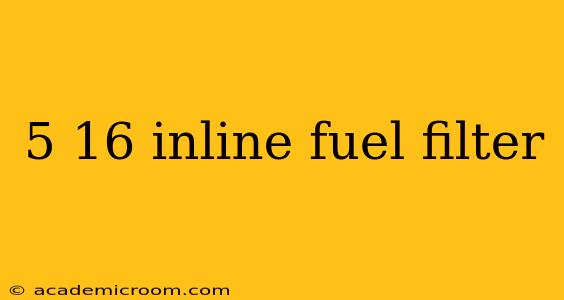Finding the right inline fuel filter for your application can feel overwhelming with the sheer number of options available. This comprehensive guide will delve into the specifics of 5/16" inline fuel filters, covering everything from their applications to installation and maintenance. We'll also address frequently asked questions to ensure you have all the information you need to make an informed decision.
What are 5/16" Inline Fuel Filters Used For?
5/16" inline fuel filters are small but mighty components crucial for protecting your engine's fuel system. Their primary function is to remove contaminants like dirt, rust, water, and other debris from the fuel line before it reaches the engine's delicate components. This prevents clogging, wear, and tear, ensuring optimal engine performance and longevity. They are commonly used in various applications, including:
- Small Engines: Lawnmowers, generators, and other small gasoline-powered equipment frequently utilize 5/16" fuel lines and benefit significantly from these filters.
- Automotive Applications: While less common in modern vehicles with sophisticated fuel systems, older cars, motorcycles, and ATVs might still employ 5/16" fuel lines and require these filters.
- Marine Engines: Some smaller marine engines use 5/16" fuel lines, making these filters an important part of their maintenance.
- Custom Fuel Systems: Individuals building or modifying fuel systems often choose 5/16" components for their projects.
What are the Different Types of 5/16" Inline Fuel Filters?
Several types of 5/16" inline fuel filters cater to various needs and applications. Key distinctions include:
- Filter Media: Filters employ different media, such as paper, cloth, or specialized materials. Paper filters are common for their cost-effectiveness, while cloth or specialized media might offer superior filtration for demanding applications.
- Flow Rate: The filter's capacity to allow fuel to flow through it is crucial. Higher flow rates are suitable for high-performance engines or systems with greater fuel demands. Consider your engine's requirements when selecting a filter.
- Material: Filter housings are typically made from materials like metal or plastic, each possessing advantages and drawbacks in terms of durability and corrosion resistance.
Choosing the right filter type depends on the specific demands of your engine and application.
How Often Should I Replace My 5/16" Inline Fuel Filter?
The frequency of fuel filter replacement depends heavily on fuel quality and usage. However, a general guideline is to replace it at least once a year, or more frequently if you notice a decline in engine performance, such as difficulty starting, rough running, or a loss of power. Always refer to your engine's maintenance schedule for the manufacturer's recommendations. Regular inspection is also advisable – if the filter is visibly dirty or damaged, replace it immediately.
Can I Clean a 5/16" Inline Fuel Filter?
Generally, no. Most 5/16" inline fuel filters are disposable and not designed for cleaning. Attempting to clean them might damage the filter media, compromising its effectiveness and potentially leading to engine damage. The cost of a new filter is significantly less than the potential repair costs associated with engine problems caused by a poorly functioning filter.
Where Can I Buy a 5/16" Inline Fuel Filter?
5/16" inline fuel filters are readily available at various retailers:
- Automotive Parts Stores: Local auto parts stores carry a wide range of filters for various applications.
- Online Retailers: Numerous online retailers offer a vast selection of filters, often at competitive prices.
- Small Engine Repair Shops: These specialized shops typically stock filters for common small engine applications.
What Size Fittings Does a 5/16" Inline Fuel Filter Use?
The fitting size is crucial for proper installation. While the fuel line is 5/16", the filter's fittings might vary slightly. Always check the filter's specifications to ensure compatibility with your fuel line. Common fitting types include push-to-connect, compression, or flare fittings. Using incorrect fittings can lead to leaks and fuel system failures.
Remember, a properly functioning fuel filter is essential for maintaining the health and performance of your engine. By understanding the various types, maintenance requirements, and purchasing options, you can ensure your equipment runs smoothly for years to come. Always consult your engine’s manual for specific recommendations regarding fuel filter type and replacement intervals.
